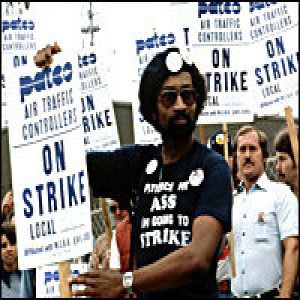
On this day in labor history, the year was 1981
That was the day 13,000 workers in the Professional Air Traffic Controllers Organization, or PATCO, went on strike.
Highly stressed workers had been driven to nervous exhaustion by long hours, problematic technology and brutal management.
They wanted better pay and working conditions, and a 32 hour work week.
PATCO workers had proven that militancy bred victories throughout the early 1970s.
But public sector employers went on the offensive as the decade drew to a close.
By the time Ronald Reagan was elected to office, automation, deregulation and inflation had taken its toll.
As Joseph McCartin details in his book, Collision Course, controllers found new technology unreliable.
They experienced on average, a computer outage a day, in critical moments of take offs and landings.
As well, the Airline Deregulation Act and the Civil Service Reform Act became laws in October 1978, serving to restrict union rights and worsen working conditions.
By the late 1970s, inflation had tripled.
Federal workers, unlike those in the private sector, lacked any COLA protections.
Emboldened by their skill level, solidarity and previous victories, the controllers walked.
Invoking Taft-Hartley, President Reagan issued a 48 hour back-to-work ultimatum.
In a historic move, he fired the strikers, jailed their leaders and forced costly injunctions that spelled doom for the union and the labor movement.
Many labor activists hoped the Teamsters and Machinists would walk out in support.
Instead the strike was a pivotal moment for labor.
It ushered in an era of unprecedented attacks not seen since the 1930s.
As Robert Weir notes, PATCO’s defeat “touched off a new wave of downsizing, decertification and concessions strikes.”
The labor movement continues to suffer its impact today.
More Episodes
 2024-05-19
2024-05-19
 2024-05-12
2024-05-12
 2024-05-12
2024-05-12
 2024-05-12
2024-05-12
 2024-05-12
2024-05-12
 2024-05-12
2024-05-12
 2024-05-12
2024-05-12
 2024-05-12
2024-05-12
 2024-05-05
2024-05-05
 2024-05-05
2024-05-05
 2024-05-05
2024-05-05
 2024-05-05
2024-05-05
 2024-05-05
2024-05-05
 2024-05-05
2024-05-05
 2024-04-28
2024-04-28
 2024-04-28
2024-04-28
Create your
podcast in
minutes
- Full-featured podcast site
- Unlimited storage and bandwidth
- Comprehensive podcast stats
- Distribute to Apple Podcasts, Spotify, and more
- Make money with your podcast
It is Free
- Privacy Policy
- Cookie Policy
- Terms of Use
- Consent Preferences
- Copyright © 2015-2024 Podbean.com




